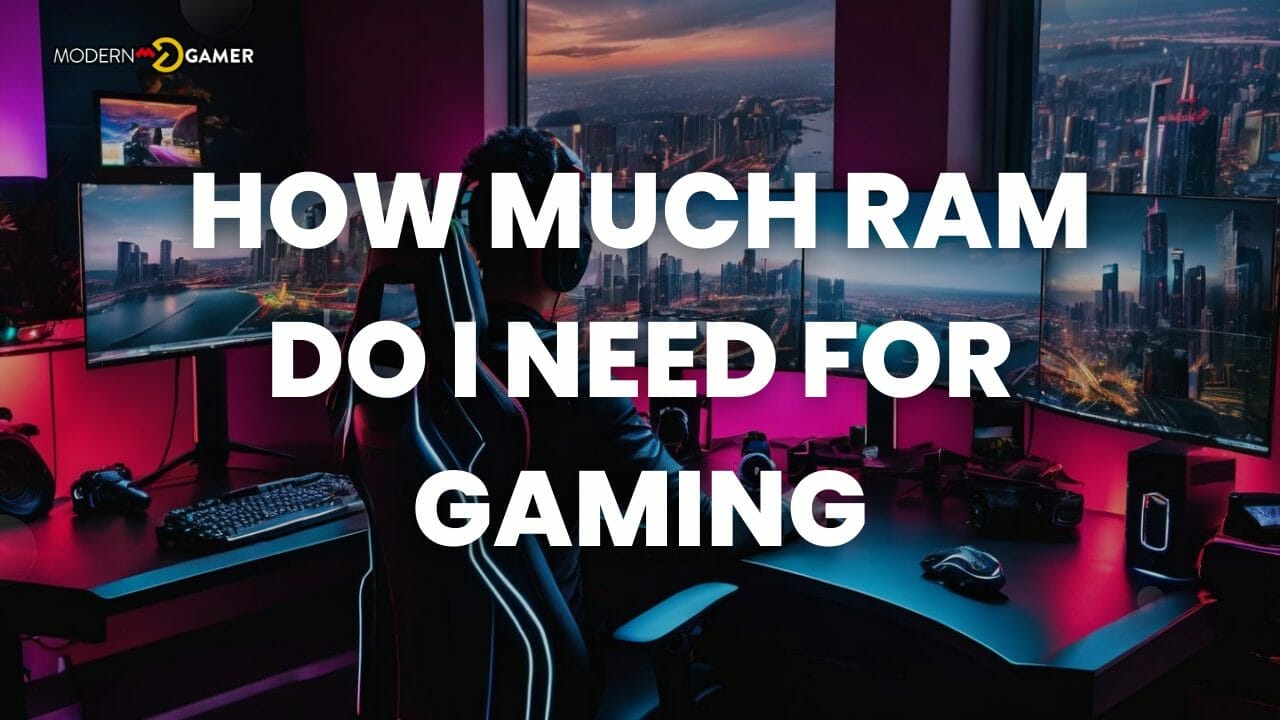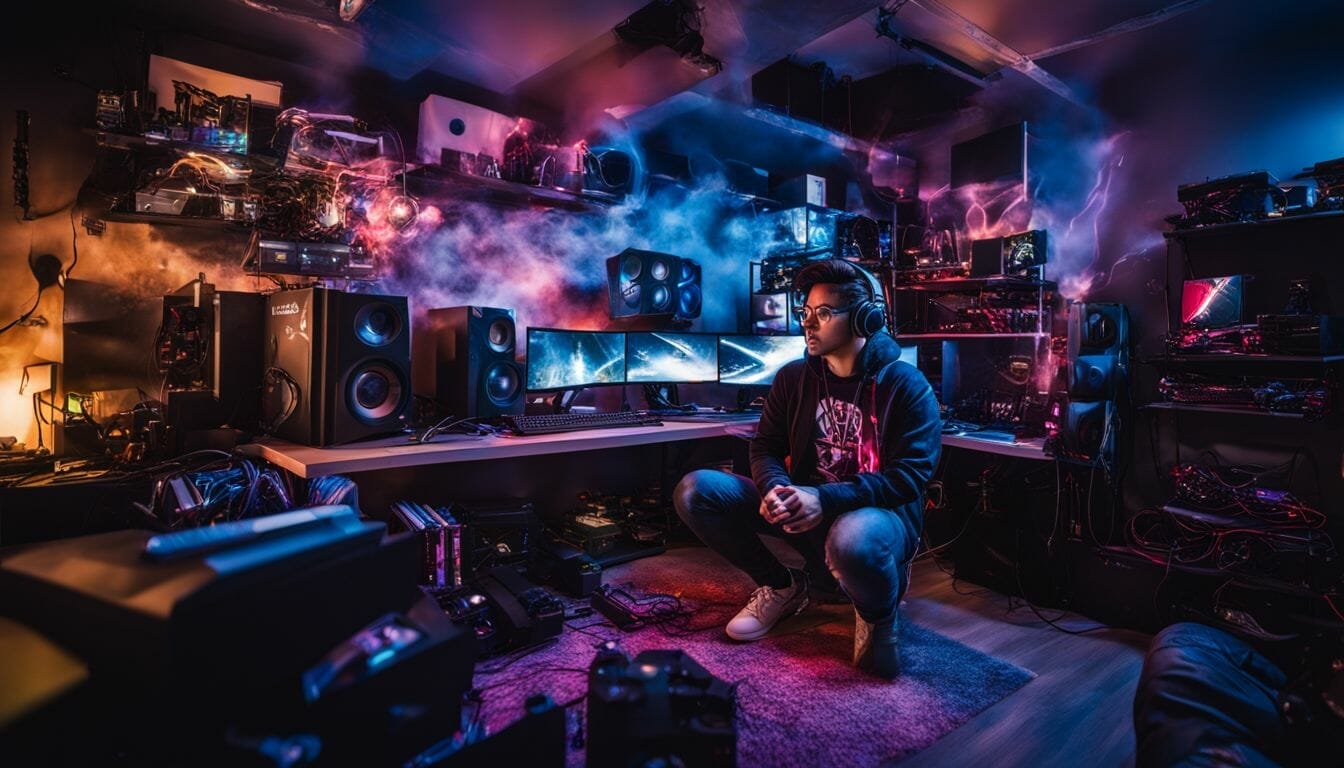Memory Matters: How Much RAM is Needed for Your Gaming Experience

Does the rush of gaming get your heart pounding and make you wonder how much RAM could boost your playtime? This curiosity led to digging deep into ways to level up gaming setups. Turns out, nearly all modern games ask for a minimum of 8GB of RAM to run smoothly. Imagine sliding through worlds without lag, thanks to that extra memory power. If the goal is to jump into flawless gaming adventures, knowing this fact might just be the game-changer to keep you glued to the screen.
In this article, we’ll go over the essentials: from how RAM affects game performance to the factors to consider when choosing your gaming system’s memory. Ready to level up your gaming set-up? Let’s get started!
Key Takeaways
- Most modern games require at least 8GB of RAM for optimal gaming performance.
- Having more RAM can lead to faster loading times, higher frame rates, and smoother gameplay.
- For most PC gamers, 16GB of RAM is recommended for a superior gaming experience.
- Consider future-proofing and multitasking needs when deciding on the amount of RAM you need.
How Does RAM Affect Gaming Performance?
 RAM plays a crucial role in gaming, impacting loading times, frame rates, and overall game performance.
RAM plays a crucial role in gaming, impacting loading times, frame rates, and overall game performance.
Understanding the role of RAM in gaming
RAM plays a big role in gaming. Its job is to keep data ready for the computer’s brain, the CPU, to use. In a game, RAM can hold parts of the game world that players see and interact with.
This means more RAM can let games load faster and run smoother. But it also means too little RAM might slow down your game or make it stop working right. Still, adding more RAM does not always make games run better.
It’s important to have enough but having more than you need won’t help much.
How RAM impacts loading times, frame rates, and overall game performance
RAM is like a fast box. It holds game data for quick use by the computer’s brain, the CPU. More RAM means we can hold more data at once! This leads to faster load times in games. We don’t have to wait for slow hard drives or SSDs to give us our game data with more RAM.
RAM also helps with how smooth a game looks and feels. A good amount of RAM keeps frame rates high. In other words, it makes moving in the game feel less jerky and more real. Games look their best too, as there’s enough space in RAM for top-quality textures.
Finally, the whole system becomes quicker with ample RAM space. Our PCs respond right away when we click things or type on our keyboards while gaming makes everything from opening menus to changing options snappier.
Remember that size matters more than speed when talking about frames per second in current games; bigger is usually better!
How Much RAM Do You Need for Gaming?

When it comes to gaming, the amount of RAM you need will depend on the specific games you play and your multitasking needs.
Minimum RAM requirements for popular games
As a PC gamer, it’s important to understand the specific RAM requirements for the games you love to play. Each game has a minimum RAM requirement to run smoothly, with some games needing more than others. Below is a table detailing the minimum RAM requirements for some of the most popular games today.
| Game | Minimum RAM Requirement |
|---|---|
| Fortnite | 4GB |
| League of Legends | 2GB |
| Counter Strike: Global Offense | 2GB |
| Minecraft | 4GB |
| Assassin’s Creed Valhalla | 8GB |
These are the minimum requirements and while you can play these games with the listed RAM, having more memory might provide a superior gaming experience. For instance, it’s common for many gamers to opt for a system with 8GB of RAM. This gives them the flexibility to run not just the game, but also any additional processes in the background without any lag or performance issues. However, if your aim is to play modern AAA games, you might want to consider 16GB of RAM. This ensures your PC has enough memory to handle the detailed graphics and complex simulations that these games often contain.
Recommended RAM for optimal gaming performance
When it comes to getting the best gaming experience, having enough RAM is important. We recommend having at least 16GB of RAM for optimal gaming performance. With 16GB of RAM, you’ll notice a significant increase in performance compared to having only 8GB.
This amount of RAM should meet the requirements of most popular games and provide smooth gameplay. If you want to future-proof your setup or run multiple high-intensity programs simultaneously, then going for 32GB of RAM would be ideal.
However, casual tests have shown that there’s little difference in performance between having 8GB and 16GB of RAM. So, if budget is a concern, starting with 16GB should be sufficient for most PC gamers without compromising on gameplay quality.
Considering future-proofing and multitasking needs
For those of us who like to plan ahead and use our PCs for more than just gaming, it’s important to consider future-proofing and multitasking needs when deciding how much RAM you need.
If you want your gaming experience to remain smooth and seamless as new games are released in the coming years, having at least 16GB of RAM is recommended. This will also provide enough memory for heavy multitasking, allowing you to have multiple applications running simultaneously without any performance issues.
Additionally, if you’re into streaming or planning on doing so in the future, having 32GB or more of RAM would be ideal. So, when it comes to considering future-proofing and multitasking needs, aiming for 16GB or above is the way to go.
Factors to Consider When Choosing RAM for Gaming
When choosing RAM for gaming, it’s essential to consider factors such as RAM capacity (8GB, 16GB, 32GB, etc.), RAM speed and latency, and compatibility with your gaming system.
RAM capacity (8GB, 16GB, 32GB, etc.)
We recommend considering different RAM capacities for your gaming PC. Here are some options to consider:
- 8GB of RAM: This is the minimum requirement for gaming and should be suitable for most games. It provides enough memory for smooth gameplay without any major issues.
- 16GB of RAM: This is the recommended capacity for optimal gaming performance. It allows you to run games smoothly while also multitasking with other programs in the background.
- 32GB of RAM: If you frequently use resource-intensive programs alongside gaming, such as video editing software or virtual machines, having 32GB of RAM can ensure a seamless experience.
RAM speed and latency
RAM speed and latency are crucial when it comes to choosing the right RAM for gaming. The speed of your RAM determines how quickly data can be accessed, which directly impacts your game’s performance.
Higher RAM speeds allow for smoother gameplay and faster loading times. On the other hand, latency measures the delay in transferring data within the RAM modules. Lower latency means less delay and better responsiveness during intense gaming sessions.
To ensure optimal gaming performance, it is recommended to aim for at least 3000MHz RAM speed while also considering lower CAS latency values for quicker response times. By prioritizing both RAM speed and latency, you can maximize your gaming experience and enjoy seamless gameplay without any hiccups or lag spikes.
Compatibility with your gaming system
Ensuring compatibility with your gaming system is crucial for optimal performance. When choosing RAM for gaming, you need to consider the capacity and speed of the RAM that aligns with your system’s specifications.
Most games recommend a minimum of 16GB of RAM for smooth gameplay and high-performance gaming. However, some games may require even more, like 32GB, to achieve optimal performance.
It’s important to check the RAM speed as well to ensure compatibility and a seamless gaming experience. So make sure you choose RAM that matches your system requirements and meets the recommended specifications for an optimized gaming experience.
Conclusion: Finding the Right Balance
When it comes to gaming, finding the right balance of RAM is crucial for optimal performance and smooth gameplay. So, how much RAM do you really need? Let’s dive into the details and find out!
Assessing your gaming needs and budget
To assess your gaming needs and budget, you should consider how much RAM is necessary for optimal performance. Most gaming PCs require a minimum of 8GB of RAM, which is suitable for popular games.
However, upgrading to 16GB can provide noticeable improvements in speed and overall performance. It allows for high-performance gameplay and the ability to switch between different games smoothly.
The specific amount of RAM you need depends on your typical workloads and the requirements of the games you play. So, factor in what you can afford while considering the benefits that additional RAM can bring to enhance your gaming experience.
Upgrading and optimizing your gaming experience
To upgrade and optimize your gaming experience, it’s important to consider upgrading your RAM. Adding more RAM can greatly enhance your gaming performance by improving frame rates and overall gameplay.
We recommend upgrading from 8GB to 16GB of RAM for smoother gameplay and reduced loading times. While some games may benefit from having more than 16GB, it’s not necessary for most gaming experiences.
So, focus on finding the right balance between your gaming needs and budget when choosing the optimal RAM size for you. By doing so, you’ll be able to enjoy an enhanced gaming experience with improved memory capacity and faster data processing.
FAQs
1. How much RAM do I need for gaming?
The amount of RAM you need for gaming depends on the specific games you play, but generally, 8GB to 16GB of RAM is recommended.
2. Will more RAM improve my gaming performance?
Having more RAM can help improve gaming performance, especially if your current amount of RAM is insufficient. However, other factors like your graphics card and processor also play a significant role in overall performance.
3. Can I upgrade the RAM in my computer for better gaming?
In most cases, you can upgrade the RAM in your computer to improve gaming performance. However, it’s important to check if your computer’s motherboard supports additional or higher capacity RAM modules.
4. Do all games require the same amount of RAM?
No, different games have different requirements when it comes to RAM. Some games may run smoothly with lower amounts of RAM while others might demand more memory for optimal performance.
5. What are the consequences of not having enough RAM for gaming?
Insufficient R
